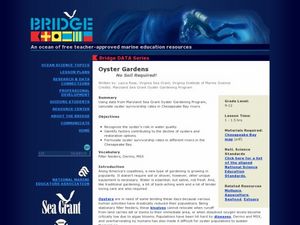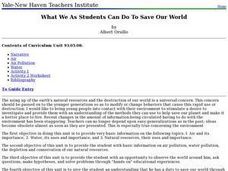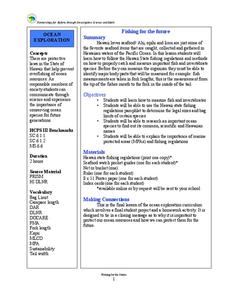Curated OER
Where Does the Water Go?/Part 1: Permeability
Pupils determine how water holding capacity influences plant growth by observing different types of soils and their ability to hold water. They record their results on a soil permeability worksheet.
Curated OER
Erosion
Young scientists identify erosion, explain the causes of erosion, and name some techniques that can slow the process of erosion. Learners are divided up into groups of four and perform a simulation of soil erosion in class. The...
Outdoor Learning Center
Outdoor Survival
Which of the following can you survive without for the longest time: water, food, or a positive mental attitude? The answer may surprise you. Guide learners of all ages through games, activities, and discussions about surviving in the...
Curated OER
Community Action
Fifth graders decide how one uses resources within a particular bioregion. In this decision making lesson, 5th graders consider the biodiversity and complexity of the ecosystem. Students select a resource (water, paper,...
Curated OER
Investigative Case - "Malama Keone'o'io"
Students study techniques for conducting a local environmental assessment in an ecologically sensitive area. Identification of native plants and methodologies for sampling is taught in the classroom and then reinforced in the field. The...
Curated OER
Oyster Gardens - No Soil Required!
Explore the practice of oyster gardening. Because oysters play a vital role in marine ecosystems and their populations have declined, biologists are transplanting oyster seed to repopulate reefs. After learning about this practice,...
Curated OER
Erosion
Fifth graders engage in some activities that will help them to identify erosion and explain the causes of erosion. They also look into ways that humans can slow the process of erosion in some cases. After a teacher-led demonstration,...
Curated OER
Aquatic Science
What a terrific way to explore the pond habitat! Learners discuss the animal and plant life found in the Long Island area. They also discuss vocabulary terms, identify pollution concerns, and resource conservation.
Global Oneness Project
Reclaiming Rivers
Robert Hass's article "Rivers and Stories" underscores the importance of rivers in the development of civilization and the importance of reclaiming supposedly dead rivers and implementing policies that protect river health. Groups...
American Museum of Natural History
Ask a Scientist About Our Environment
Let's ask an expert! Scientists at the American Museum of Natural History field questions about the environment in an interactive resource. Question topics range from global warming and conservation to endangered species and habitats.
Teach Engineering
Designing a Winning Guest Village in the Saguaro National Park
Don't desert a resource on the desert! Scholars work in groups to build on their ideas from the previous lesson to design a sustainable guest village in the Saguaro National Park. Each group produces a PowerPoint presentation to share...
Texas State Energy Conservation Office
Global Climate Change
Here is an extensive reading resource that addresses our climate change crisis. It thoroughly explains the greenhouse effect, related Earth cycles, and the history of climate change. Use it as part of the intended unit, published by the...
Columbus City Schools
It’s Electric!
Shocking! Who knew so many great ideas existed for teaching middle schoolers about electricity? Find them all within this energetic framework. You'll light up at the variety of printable and web-based resources within! After building...
Curated OER
Wat-er We Good For?
Fifth graders investigate the use of water as a resource that needs to be conserved. They practice the skill of water conservation by taking a home survey of water usage and modify the use in order to decrease the wasting of water.
Curated OER
Desert Xeriscaping
Seventh graders identify native species of desert vegetation, plan a xeriscape landscape, and recognize the importance of water conservation.
Curated OER
Cleansing, Sparkling Koos
Students explore the importance of water conservation and investigate how plants clean water.
Curated OER
Outdoor Education
Students participate in various outdoor activities to teach them about the environment. In this outdoor education lesson plan, students participate in activities such as compass direction, conservation, forestry, wildlife, and...
Curated OER
What We As Students Can Do To Save Our World
Students investigate air and water pollution, and the conservation of natural resources.
Curated OER
Protect for Safekeeping
Students observe the North Dakota quarter reverse and discuss its imagery and meaning. They define "endangered species" and "conservation." They read books about recycling and conservation. They complete a worksheet about recycling and...
Curated OER
Commonalities and Differences from Africa to Cleveland as Evidence Through the Gullah Community Connection
Students explore Afro-American history. They identify the commonality between African, Carolinian and Cleveland Black culture. Students explore the water cycle, oceanography, hydrology and bio-geochemical processes. They discuss the...
Curated OER
Habitat
Young scholars are able to define habitat. They are able to identify the four things that living things need to survive. Students are able to describe how living things are adapted to their habitats.
Curated OER
TE Activity: The Great Divide
Students simulate the distribution of nonrenewable energy resources using cookies. They determine how the world's growing population effects the equitable distribution of these resources. They look at how engineers work to develop...
Curated OER
Fishing for the Future
Students research Hawaii's fishing regulations. In this conservation lesson, students explore the reasons behind ocean conservation. Resources are provided.
Curated OER
Recycling
In this recycling worksheet, students review what items can be recycled, what is made from recycled items, and how recycling conserves resources. This worksheet has 5 word scramble, 10 short answer, and 5 multiple choice questions.























